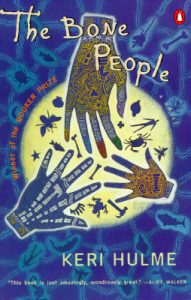
The story of a lone woman, a mute boy who seeks her out, and the boy’s adopted father, The Bone People broke my heart over and over and over with complex tales of isolation, abuse, and alcoholism. I’m going to focus on the writing part today (partly because I don’t know how to do the story justice without revealing too much), but if you ever need to see how well broken people can be inhabited and conveyed in a way that is neither overly sympathetic nor antagonistic but always deeply heartfelt, read this book. I learned so much and I know there’s a lot more to learn should I read it again.
Writing Your Culture
Part Maori and part British Islander, Hulme is a New Zealander through and through. I knew from the moment I read in her introduction, “I live five hundred miles away, don’t have a telephone, and receive only intermittent mail delivery” that this was a woman who was living a life very unlike my own. And that comes through beautifully in the book. The craggy landscape, the relationship with the sea, the nuances of interaction between the indigenous population and the settlers—it’s all there and it’s conveyed with an extraordinary authenticity. Funny how you can point out the things that tie a book to its culture, but if you try and write it from the outside, it’s never the same.
Writing Yourself
The similarities in this book between the author, Keri Hulme, and the protagonist, Kerewin Holmes, including her ethnicity and her penchant for isolation, were uncanny enough that I thought they would interfere with my reading of the book. They did not. Instead, she managed to create this work that is so wholly her own that fact and fiction don’t matter. I was so enthralled in the narrative at times that I’d avoid picking the book up because I knew I could not put it down again.
“I was lucky with my editors, who respected how I feel about… oddities. For instance, I think the shape of words brings a response from the reader—a tiny, subconscious, unacknowledged but definite response.” – Keri Hulme
And this book is original. From the opening line, “He walks down the street. The asphalt reels by him,” through the first few pages, I had no idea what was happening, but the force of her writing compelled me forward. I had the sense that this book came from the very depths of Hulme and I always wanted to read more.
Nonconformity in Writing.
To be fair, there are lots of writers out there doing their own things with language. Some very subtly and some very obviously. But few have reshaped the conventions as much as Hulme does in this book and managed to win so much acclaim. She starts the book with a fugue state where the reader has no idea what’s happening. She invents her own style of how the text should look. She intersperses whole Maori phrases. It’s an absolutely maddening book. But it’s so completely compelling, too.
Maybe she wrote this book this way because it depicts a lifestyle that’s outside the literary norm. Or maybe this is the way the words come to her. What’s important to me about this book is that for all of the differences between her style and whatever expectation I may have had, she grabbed me by the emotional core and hung on. Every difficult passage or heartbreaking moment is rewarded by some insight into either the characters or a way I could be rethinking my own language.
Finding my Voice
Subscribers to this blog know that I’m wrestling a lot with my writing right now in the months following publishing Polska, 1994, my first novel. What I learned from Hulme is that I need to pull inward, to find that voice at the center of my core. I can (and do) learn all kinds of tools from the writers around me, but the gestation of my voice is my individual responsibility. It comes from learning to trust myself, from praising myself instead of seeking praise, and from being willing to dwell alone in that creative space. I may not run 500 miles from the nearest telephone (although that sounded wonderful for a few brief moments), but I must be willing to sit with myself and my writing. That’s the only way I’m ever going to make anything worth reading again.
What are the books that have most challenged you? What did you learn from them? I’d love to hear from you in the comments.
If you want to explore the magical heartbreak of The Bone People, pick up a copy from Bookshop.org. Your purchase keeps indie booksellers in business and I receive a commission.
Leave a Reply